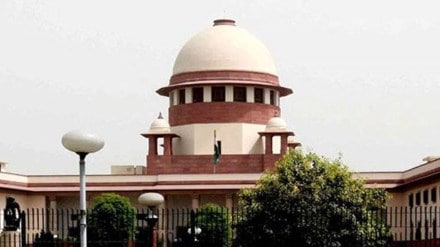The Supreme Court on Tuesday said that it would “steer clear of personal laws” governing marriages while deciding the pleas seeking to legalise same-sex marriage on Tuesday. The top court added that it will only examine if the right can be conferred under The Special Marriage Act (SMA), 1954.
Chief Justice of India D.Y. Chandrachud also asserted that there was no “absolute concept of a man or an absolute concept of a woman” and that gender was “far more complex” than one’s genitals.
A Constitution Bench headed by CJI Chandrachud was responding to the Centre’s argument that laws, including the Special Marriage Act, recognised only heterosexual marriages between a “biological man and a biological woman”.
The hearing on the sensitive issue witnessed the Centre vehemently urge the top court to first consider its preliminary objection to the apex court going into the question which essentially falls in the Parliament’s turf.
This prompted a sharp response from the five-judge Constitution bench. “I am sorry Mr. solicitor, we are in-charge,” the CJI told Solicitor General Tushar Mehta, who was appearing for the Centre.
“You cannot dictate how we will conduct the proceedings. I have never allowed this in my court,” the CJI observed, as reported by news agency PTI. The bench added that the nature and tenability of the preliminary objection will depend on the canvas the petitioners open up.
Describing the issue involved in the petitions as ‘complex’, the bench asked the lawyers appearing in the matter to advance arguments on the Special Marriage Act 1954, which is a religion neutral statute.
What is the Special Marriage Act, 1954?
The Special Marriage Act, 1954 was passed by Parliament on October 9, 1954. It is a law that provides a legal framework for the marriage of people belonging to different religions or castes.
It empowers two adult individuals to marry through a civil contract, where the state sanctions the marriage rather than the religion.
Issues of personal law such as marriage, divorce, adoption are governed by religious laws that are codified. These laws, such as the Muslim Marriage Act, 1954, and the Hindu Marriage Act, 1955, require either spouse to convert to the religion of the other before marriage.
However, the Special Marriage Act enables marriage between inter-faith or inter-caste couples without them giving up their religious identity or resorting to conversion.
The Indian system, where both civil and religious marriages are recognised, is similar to the laws in the UK’s Marriage Act of 1949. An earlier version of the SMA was enacted in 1872 and was later re-enacted in 1954 with provisions for divorce etc.
Who can get married under the Special Marriage Act?
Under this Act, people of all faiths — Hindus, Muslims, Sikhs, Christians, Sikhs, Jains, and Buddhists — are included and no religious ceremony or rites are required to be performed. Some customary restrictions such as parties not being within degrees of a prohibited relationship still apply to couples under the Special Marriage Act.
Prerequisites of the Special Marriage Act
The conditions for this particular type of marriage is similar to those for regular customary marriages and are fairly comparable to Section 5 of the Hindu Marriage Act, 1955.
Both spouses should be monogamous at the time of marriage i.e., neither party should have a living spouse at the time of marriage.
Both spouses must be mentally fit and in a position to make their own decisions.
The man must be at least 21 years old and the female must be at least 18 years old at the time of marriage.
The spouses should not be blood relatives.
The spouses would need to file a notice of intended marriage to the marriage registrar of their district, where atleast one of the spouses has been living for the last 30 days. The marriage registrar publishes the notice of marriage in his office and the notice remains for 30 days. The marriage is solemnised if it hasn’t been objected to by a third party.
The marriage under this special act is solemnised at the specified marriage office by the marriage registrar.
Divorce Under The Special Marriage Act
One can file for a divorce in the district court under the Special Marriage Act, only if the marriage was solemnised under the Special Marriage Act, 1954.
